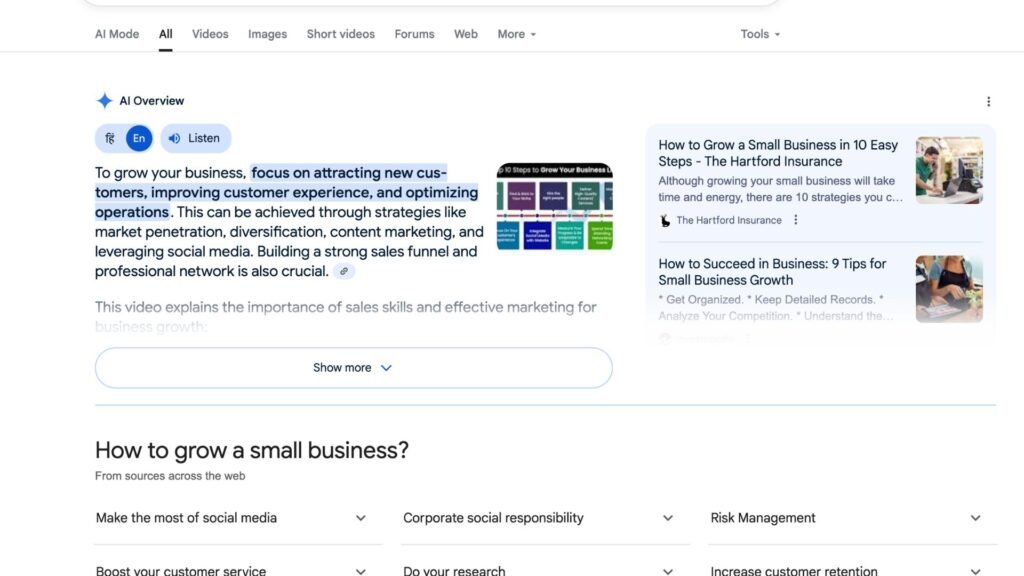In the era where AI overviews are taking share of websites struggling to rank on the SERPS, this detailed guide can help you rank better in AI Overviews and Search Results.

There is a shift towards AI-powered search. The way content is displayed in search results has undergone a significant change. Google’s AI Overview illustrates this change. The AI overview is a feature that provides an AI-generated summary of the content you are searching for at the top of the search results page. For everyone, adapting to this evolution of AI isn’t optional; it is essential. Ranking in AI overviews and search results in 2025 requires rethinking content, implementing advanced SEO strategies, and optimising content for the user’s convenience, tailored for AI systems. Let us explore how you can optimise your website and content to stand out in the AI search ecosystem.
What are AI Overviews?

AI overviews are auto-generated answers powered by Google’s generative AI model, formerly known as Search Generative Experience. These answers combine information from multiple sources, providing users with quick and contextual responses.
| Feature | Featured Snippets | AI Overviews |
| Source | Single source | Multiple sources |
| Depth | Brief answer | Summary with proper context. |
| Interaction | Static | Follow-up suggestions |
| Ranking Difficulty | High | Higher |
Why Does it Matter for Your Website?
It matters because if your website isn’t optimised for AI overviews, you may miss out on prime visibility to attract visitors, hindering your website’s growth. When your content appears in AI Overviews, it can help build brand credibility, attract more visitors, and increase clicks, as measured by Click-Through Rate.
How Google Selects Content for AI Overviews
AI Overviews utilise advanced algorithms to gather information from multiple sources that accurately and quickly answer the user’s questions. Google considers technical quality, content clarity, and authority in its selection process.
-
EEAT – Experience, Experience, Authority, Trustworthiness
The concept is part of Google’s search quality guidelines that assess the quality and reliability of the content, with content that mainly affects people’s health, safety, financial stability, and overall well-being. The guidelines are a signal to your audience that you are trustworthy.
-
Contextual Understanding
Google will recognise the content that is well-organised, clear, and concise. The content should align with the intent of the questions. The content should provide in-depth explanations. The easier it is to read and scan, the more likely Google will recognise it.
-
Structured Data
Structured data makes it easier for the AI to understand the content and its relevance according to the question, increasing the chance of being featured in the search results.
-
Mobile Friendly
Your site should load quickly and preferably be mobile-friendly, as most people prefer searching on their mobile phones, which is handy and provides good user experience metrics.
ALSO READ: Leveraging Data Analytics for Business Growth
How to Rank in Google’s AI Overviews and Search Results (Step-by-Step Guide)
AI learns patterns and structures from data and uses that information to generate better search results. You need to stop focusing solely on keywords and instead build a trustworthy and recognisable brand. Find ways to demonstrate your expertise and support users in finding relevant search results. Organise your content to offer comprehensive answers. Concentrate on delivering well-structured responses.
-
Add context to your articles
When you write an article on any information, along with keywords, focus on a simple, easy-to-read format, and add enough of context for the search results. According to the Surfer SEO Study, Google focuses on context over keywords. Keywords are less important in AI Overviews. Structure the content to answer the questions entirely.
-
Use Long-Tail Keywords
Reportedly, AI Overviews focus on specific long-tail keywords rather than generic ones. AI Overviews are tailored to address complex and specific questions. You can easily find relevant long-tail keywords using free tools like Google Autocomplete, the People Also Ask section or Related Searches.
-
Optimise On-Page SEO
Reportedly, AI Overviews sources from the top 10 search results, so if your page ranks, then it has a chance of getting cited. Use primary and secondary keywords in titles, headings, and subheadings. Write meta descriptions to boost the Click-Through Rate and ensure your content meets EEAT guidelines.
-
Optimise for Mobile SEO
Google evaluates your site’s mobile performance while determining the rankings. You can use easy to use and responsive design to ensure that your site will display well on devices. Improve the page load speed for mobile users.
-
Format Content
Well-structured content that uses bullet points, lists, and sections is often prioritised. You can use bullet points, numbered lists, and short paragraphs. Structured content with clear headings and subheadings will be preferred. Break up the long sentences with visual elements added.
-
Publish Time with Relevancy
AI Overviews go for up-to-date information. So regularly update your information and ensure it remains current.
-
SEO Structured Data
Use a machine-readable format with structured data. You can implement the structured data using the schema markup types. The schema types include FAQ schema, How-To Schema, and Article Schema.
-
Build Semantic Authority
The AI Overview assess semantic connectivity in your content. You can build the content according to that, interlink related content posts, create content clusters, use synonyms and related phrases, and answer multiple intent layers.
-
Focus on Query Relevancy
AI Overviews focus on content being contextually correct and relevant. You can use tools like Surfer SEO for NLP-based optimisation, RankMath for schema, and you can use Keyword.com to track the performance in AI Overviews.
Metric to Track Your Visibility in AI Overviews
AI Overviews do not just rely on a single source, since they go for multiple sources. Tracking the sources can be tricky, but it is possible. You can monitor those on AI impression share using tools like Keyword.com or SEOTesting, organic CTR through Google Search Console, and growth in long-tail and question-based keywords.
Tips To Future-Proof Your Content
- Add dates and “Last updated.”
- Build topical authority, cover the topic or subject from multiple angles.
- Answer the questions with 100 to 300-word summaries.
- Use social media platforms like YouTube and embed relevant videos for detailed understanding.
- Monitor what kinds of questions AI Overviews focus on in your expertise.
Ranking in Google’s AI Overviews is the next frontier of SEO. As AI-driven search becomes mainstream, content must evolve from keyword-heavy to user-centric, semantically rich, and structured for machines. Now is the time to audit your site for structure and format of the content, update old content with updated insights and schema, build topic clusters and double down on EEAT, and get your SEO tools aligned with AI-search metrics.
ALSO READ: The Role of Content Marketing in Lead Generation
FAQs
- Is AI Overview the same as Featured Snippet?
No. AI Overviews are better, AI-generated summaries that use multiple sources, whereas Featured Snippets pull a single quote or list from one URL.
- Can I control if my site appears in AI Overviews?
Not entirely, but optimising your structure, EEAT, schema, and semantic relevance increases your chances.
- How do I know if I’ve been featured in an AI Overview?
Use third-party tools like Keyword.com and track sudden increases in impressions/engagement for AI-like queries.
- Will ranking in traditional search still matter?
Absolutely. AI Overviews often cite or summarise high-ranking pages. Think of it as an extra layer, not a replacement.
- Do paid ads affect AI Overview rankings?
No, AI Overview rankings are organic and based on content quality and relevance, not ads.
ALSO READ: The Role of Influencer Marketing: A Game-Changer for Brands
